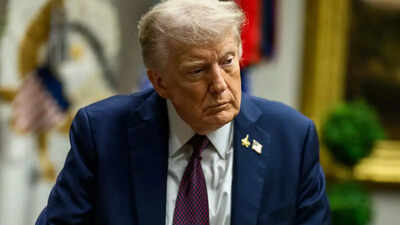ARTICLE AD BOX

President Donald Trump has long criticized the nation’s elite universities, labeling some as anti-American and dismissing campus leaders as “Marxist maniacs and lunatics.” His administration has also withheld billions of dollars in federal research funding to pressure colleges into aligning with his political priorities.These aggressive measures are now complicating the administration’s efforts to implement large-scale changes across higher education. This week, several leading institutions declined to endorse a so-called “compact” that would tie support for Trump’s policies, including a strict definition of gender and caps on international students, to access to federal research funds.
Universities push back
The White House initially approached nine top schools, including the Massachusetts Institute of Technology, Brown University, the University of Pennsylvania, University of Southern California, the University of Virginia, and Dartmouth.
Six of these institutions formally rejected the proposal. Brown and Penn faced particularly strong pressure from faculty and students, especially after settlements that restored previously frozen research funding.Marc Rowan, the financier promoting the compact, insisted on including Brown and Penn despite their reluctance, according to three people familiar with the discussions, The New York Times reports. Other institutions, including the University of Texas, responded more favorably, while the administration extended invitations to Arizona State University, the University of Kansas, and Washington University in St.
Louis to participate in discussions.The strategy produced limited success. Officials from these three schools attended a virtual meeting with the White House on Friday, described as preliminary but productive. Yet, in the hours following the meeting, both Virginia and Dartmouth announced they would not sign the compact. Paul Mahoney, the interim president at Virginia, argued that linking research funding to policy compliance would compromise the integrity of academic research.
Dartmouth’s president, Sian Leah Beilock, wrote that the compact “would compromise our academic freedom, our ability to govern ourselves, and the principle that federal research funds should be awarded to the best, most promising ideas.”
Pressure tactics and unintended consequences
The administration has justified its approach by citing the need to protect Jewish students and address what officials perceive as ideological bias on campuses. Liz Huston, a White House spokeswoman, warned that institutions unwilling to implement reforms would risk losing government support. May Mailman, a senior adviser involved in crafting the compact, suggested the broader issue is declining public confidence in universities rather than the administration’s methods, The Times reports.Yet the rejections illustrate the risks inherent in aggressive political tactics. Higher education leaders say that punitive measures and last-minute initiatives have made it difficult to build the kind of alliances typically needed to enact significant reforms. The White House has largely sidestepped the legislative process, relying instead on investigatory and regulatory tools to press universities into compliance.
Actions such as banning hundreds of library books at the US Naval Academy, deemed inconsistent with the administration’s political agenda, have further alienated potential allies.Ohio State University’s president, Ted Carter, who previously oversaw the Naval Academy, acknowledged being open to some of the administration’s proposals but said the book bans forced him into a defensive position. “If they had tried to remove books on my watch, it would have been over my dead body,” The Times reports.
A broader clash over academic freedom
Harvard University, which became a central target of the administration’s campaign, had already been advocating for intellectual diversity prior to Trump’s election. Hundreds of college presidents later signed letters condemning what they described as unprecedented government overreach and political interference. Dozens of institutions, including Ivy League universities and MIT, supported Harvard’s lawsuit challenging the halt of federal research funding.Letters inviting colleges to participate in the compact were sent after business hours and offered little public explanation, heightening skepticism. Corey Brettschneider, a political science professor at Brown University, told The Times that the compact revealed “an administration that is not really looking out for intellectual inquiry.”
The road ahead
Despite these challenges, the White House continues to frame the compact as a collaborative effort. According to Huston, leaders “have been invited to the table to share ideas with the administration, and we look forward to discussing transparent ways that, together, we will produce future generations of American excellence,” as reported by The Times.The standoff highlights a fundamental tension in American higher education: the balance between political oversight and academic autonomy. The Trump administration’s aggressive approach has tested the boundaries of this balance, prompting universities to defend principles of merit-based research, intellectual freedom, and institutional independence. Whether this moment will reshape the relationship between the federal government and higher education remains uncertain, but the episode underscores how assertive political tactics can disrupt longstanding educational norms.

 7 hours ago
5
7 hours ago
5









 English (US) ·
English (US) ·